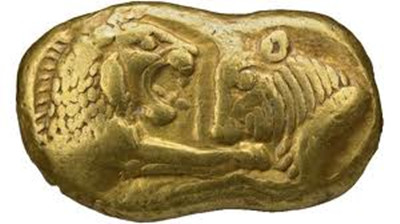But actually it was his own empire, Lydia, that was conquered.
最終,是他自己的帝國呂底亞戰敗,
Croesus was captured by the great Persian king Cyrus, and he became the world's favourite moralising example of how fortune can turn, even against the richest!
克羅伊斯被居魯士大帝俘虜。他成為世界上最知名且具具說服力的例子,命運如何充滿變數,甚至對最富有的人也是如此!
In fact, his end wasn't so bad.
但其實,他的結局也沒那么凄慘,
Cyrus shrewdly appointed Croesus as an advisor-I like to think as his financial advisor-and the victorious Persians quickly adopted the Lydian model, spreading Croesus's coins along the trade routes of the Mediterranean and Asia, and then minting their own coins in pure gold and pure silver at Croesus's mint in Sardis.
居魯士十分精明,他讓克羅伊斯擔任自己的顧問—我猜是財政顧問—勝利的波斯迅速釆用了呂底亞模式,克羅伊斯的金幣沿著地中海和亞洲的貿易路線散播。其后,波斯人在克羅伊斯位于薩迪斯的造幣廠鑄造自己的純金純銀貨幣。這一做法與庫施人征服埃及后吸收埃及文化如出一轍。
It's an intriguing fact that coinage was invented at pretty well the same time in both China and in Turkey, and it's probably not a coincidence.
中國與土耳其幾乎在同一時間發明了貨幣,這也許并非巧合。
Rather, I think, they're both responses to the fundamental changes seen across the world around three thousand years ago from the Mediterranean to the Pacific.
三千年前,從地中海到太平洋,世界正發生著根本性的變革。貨幣的出現正是在回應這樣的變革。
There were military, political and economic upheavals that brought us not only modern coinage, but something else that's resonated till the present day-new ideas about how people and their rulers saw themselves, in short, the beginning of modern political thinking, the world of Confucius and Classical Athens.
軍事、政治和經濟的巨變帶來了現代貨幣,也帶來了一些至今仍能引起共鳴的嶄新觀念:人民與統治者全新的自我定位。簡單來說,這便是現代政治思想的開端,開啟了孔夫子與古代雅典的世界。
That's what we're going to be looking at next week, and we're going to start with the people that toppled Croesus-the Persians.
下一部分,我們將以推翻了克羅伊斯統治的波斯人作為起點。












